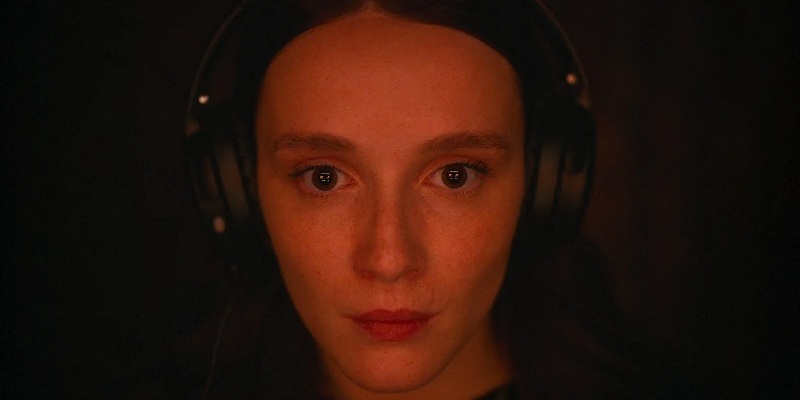
Review by
Eric Hillis
Directed by: Pascal Plante
Starring: Elisabeth Locas, Juliette Gariépy, Laurie Babin, Maxwell McCabe Lokos,
Natalie Tannous, Pierre Chagnon

There's probably a great movie to be made about "murder groupies,"
those women who romantically obsess over men convicted or accused of
homicide. Writer/director Pascal Plante's
Red Rooms isn't a great movie, but its exploration of this
milieu makes it a mildly absorbing and highly disturbing watch.

Bella Thorne lookalike Juliette Ganépy plays Kelly-Anne, a model
who becomes a fixture in the public gallery of the trial of Ludovic
Chevalier (Maxwell McCabe-Lokos), who is accused of the murders
of three teenage girls. What makes the case particularly grisly is how
the killer streamed the torture and murder of his victims to a paying
audience on the dark web. The chief evidence against Chevalier is that
facial recognition software identified his eyes as those of the masked
killer in the videos of two recordings the police uncovered. The defence
states that such software is unreliable and points to Chevalier's lack
of a criminal record. The recording of the third murder, which might
contain enough evidence to convict Chevalier, remains
undiscovered.
When a reporter asks Kelly-Anne why she's attending the trial, her
response is simply "I was curious." Kelly-Anne's motivations are kept
ambiguous for most of the runtime, leaving us to wonder if she's an
avenging angel or merely a ghoul. Kelly-Anne is befriended by Clementine
(Laurie Babin), a young girl barely older than Chevalier's
victims but who is convinced of his innocence. Kelly-Anne never reveals
her own thoughts on the matter, but at night in her apartment she trawls
the internet as she seeks clues as to how to find the elusive third
recording.

As a procedural thriller, Red Rooms is left wanting by
the unconvincing nature of how Kelly-Anne conducts her investigation. As
we watch her navigate various websites and databases we're left to
assume she knows what she's doing, but it simply doesn't make sense that
this amateur sleuth would be able to so easily track down details the
FBI has failed to uncover. The way Plante's camera observes the mother
of one of the victims suggests that she may be involved in the crimes,
but this element leads nowhere.
Red Rooms works best if viewed as a mood piece removed
from real world logic. Perhaps it's down to the grim nature of the
subject matter as much as Plante's filmmaking chops, but there's an
unnerving atmosphere throughout that really gets under your skin.
Despite the accused killer being safely locked away, we still get the
sense that Kelly-Anne is in grave danger and meddling with forces of
indescribable evil.

The "Red Rooms" of the film, where an audience of sickos pays to watch
violence being inflicted on a victim, probably don't exist in real life,
but we've all heard of those cases where live-streamers are egged on by
their fans to commit atrocities. Plante's film is a cautionary tale
about the potential for evil that exists in the ones and zeroes of the
internet, but it never plays like a piece of luddite fear-mongering.
It's made clear here that humans are fully capable of exploring their
darkest nature; technology just helps to facilitate it.

Red Rooms is on UK/ROI VOD now.

